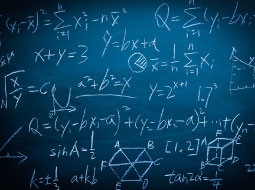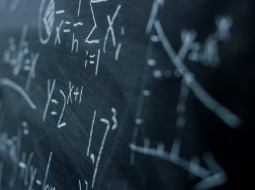Online courses directory (418)
Analysis I covers fundamentals of mathematical analysis: metric spaces, convergence of sequences and series, continuity, differentiability, Riemann integral, sequences and series of functions, uniformity, interchange of limit operations.
This is an advanced topics course in model theory whose main theme is simple theories. We treat simple theories in the framework of compact abstract theories, which is more general than that of first order theories. We cover the basic properties of independence (i.e., non-dividing) in simple theories, the characterization of simple theories by the existence of a notion of independence, and hyperimaginary canonical bases.
Geometry of Manifolds analyzes topics such as the differentiable manifolds and vector fields and forms. It also makes an introduction to Lie groups, the de Rham theorem, and Riemannian manifolds.
6.844 is a graduate introduction to programming theory, logic of programming, and computability, with the programming language Scheme used to crystallize computability constructions and as an object of study itself. Topics covered include: programming and computability theory based on a term-rewriting, "substitution" model of computation by Scheme programs with side-effects; computation as algebraic manipulation: Scheme evaluation as algebraic manipulation and term rewriting theory; paradoxes from self-application and introduction to formal programming semantics; undecidability of the Halting Problem for Scheme; properties of recursively enumerable sets, leading to Incompleteness Theorems for Scheme equivalences; logic for program specification and verification; and Hilbert's Tenth Problem.
This free online course is the first of our Upper-Secondary Mathematics suite of courses. It covers mathematical analysis, including univariate statistics and data, bivariate statistics, correlation, regression, residual analysis, non-linear data, and seasonal movements. This course is suitable for students of maths, especially those preparing for examinations. It is also suitable for those looking to refresh their knowledge of Mathematics. <br />
Differential Equations are the language in which the laws of nature are expressed. Understanding properties of solutions of differential equations is fundamental to much of contemporary science and engineering. Ordinary differential equations (ODE's) deal with functions of one variable, which can often be thought of as time.
This free online course in algebra from ALISON will guide you through among other things expressions, systems of equations, functions, real numbers, inequalities, exponents, polynomials, radical and rational expressions. The course is divided into 12 chapters and each chapter is divided into several lessons. Under each lesson you will find theory, examples and video lessons. This course is ideal for learners who want to study topics in algebra in detail.
This course is an introduction to linear optimization and its extensions emphasizing the underlying mathematical structures, geometrical ideas, algorithms and solutions of practical problems. The topics covered include: formulations, the geometry of linear optimization, duality theory, the simplex method, sensitivity analysis, robust optimization, large scale optimization network flows, solving problems with an exponential number of constraints and the ellipsoid method, interior point methods, semidefinite optimization, solving real world problems problems with computer software, discrete optimization formulations and algorithms.
Online course for preparing for the Quantitative section of the GRE.
Double affine Hecke algebras (DAHA), also called Cherednik algebras, and their representations appear in many contexts: integrable systems (Calogero-Moser and Ruijsenaars models), algebraic geometry (Hilbert schemes), orthogonal polynomials, Lie theory, quantum groups, etc. In this course we will review the basic theory of DAHA and their representations, emphasizing their connections with other subjects and open problems.
Numerical methods for solving problems arising in heat and mass transfer, fluid mechanics, chemical reaction engineering, and molecular simulation. Topics: numerical linear algebra, solution of nonlinear algebraic equations and ordinary differential equations, solution of partial differential equations (e.g. Navier-Stokes), numerical methods in molecular simulation (dynamics, geometry optimization). All methods are presented within the context of chemical engineering problems. Familiarity with structured programming is assumed. The examples will use MATLAB®.
Acknowledgements
The instructor would like to thank Robert Ashcraft, Sandeep Sharma, David Weingeist, and Nikolay Zaborenko for their work in preparing materials for this course site.
This course is divided into two sections, Part I and Part II. Part I, found here, provides an introduction to statistical theory. A brief review of probability will be given mainly as background material, however, it is assumed to be known. Topics include normal distribution, limit theorems, Bayesian concepts, and testing, among others.
Part II prepares students for the remainder of the econometrics sequence and and can be found by visiting 14.381 Fall 2006.
This course provides an introduction to the language of schemes, properties of morphisms, and sheaf cohomology. Together with 18.725 Algebraic Geometry, students gain an understanding of the basic notions and techniques of modern algebraic geometry.
This course is an introduction to differential geometry. The course itself is mathematically rigorous, but still emphasizes concrete aspects of geometry, centered on the notion of curvature.
<p>This course is ideal for people who want to gain a thorough understanding and knowledge of advanced topics in algebra. </p><br /> <p>The advanced algebra topics include linear equations, inequalities, graphs, matrices, polynomials, radical expressions, quadratic equations, functions, exponential, logarithmic expressions, sequences, series, probability and trigonometry. </p> <br /> <p>The course is divided into 13 modules and each module is divided into lessons with theory, examples and video explanations, making for an enhanced study experience. </p>
Sal works through the problems from the CA Standards.
Geometry and Quantum Field Theory, designed for mathematicians, is a rigorous introduction to perturbative quantum field theory, using the language of functional integrals. It covers the basics of classical field theory, free quantum theories and Feynman diagrams. The goal is to discuss, using mathematical language, a number of basic notions and results of QFT that are necessary to understand talks and papers in QFT and String Theory.
This intermediate math course continues our free online maths suite of courses. It covers rules and applications of differentiation, straight line graphs, graphing circular functions, logs and indices, the Binomial theorem, inverse functions, and factors of polynomials. This course is ideal for second-level students, anyone studying for an exam, and those interested in re-igniting their knowledge of mathematics!<br />
This course teaches the art of guessing results and solving problems without doing a proof or an exact calculation. Techniques include extreme-cases reasoning, dimensional analysis, successive approximation, discretization, generalization, and pictorial analysis. Applications include mental calculation, solid geometry, musical intervals, logarithms, integration, infinite series, solitaire, and differential equations. (No epsilons or deltas are harmed by taking this course.) This course is offered during the Independent Activities Period (IAP), which is a special 4-week term at MIT that runs from the first week of January until the end of the month.
Trusted paper writing service WriteMyPaper.Today will write the papers of any difficulty.






















